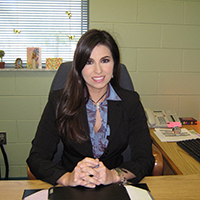Brooke Layton
Leah Walton2025-09-02T19:46:40-04:00 Lesson Designer
Professor, Author, and School Advisory Council Leader
Brooke Layton lives in Tampa, Florida, with her husband and her son, Tristan. She has more than ten years of hands-on teaching experience as well as numerous leadership experiences. She taught grades K-5 for about ten years before transitioning to becoming an assistant principal for Hillsborough County. She is currently a professor at Ashford University where she teaches a variety of undergraduate courses. She obtained her Masters in Educational Leadership at the American College of Education and her Bachelor of Science in Elementary Education from the University of South Florida.
As an author, she has utilized her knowledge in education to create a story that not only captures the heart and interest of young readers, but also incorporates lasting learning experiences.
As a teacher, she was fortunate to lead her school in many areas. She created a strong and successful SAC (School Advisory Council) and a reading initiative partnership, as well as trained staff in science, reading, and technology; mentored new teachers and interns; created school-wide assessment and behavior policies; and led many other initiatives that have helped lead to the success of her students and her school. These opportunities have allowed her to become an agent of change who drove success in her place of employment and created new standards in excellence.
As an assistant principal, she managed many areas of learning, from the training of teachers to the academic needs of many students. In addition to this, she attended to discipline matters, created school-wide schedules, organized school-wide events, evaluated teachers, served as the acting principal in the absence of the building principal, completed text book inventory, trained teachers, analyzed and gave school-wide and individual feedback on state and formative assessments, led Response to Intervention meetings (RTI), and Administrative team duties.
As a life-long educator, she made it a priority to strive to be the leader who drives change not only in the classroom, but change that shapes a lifetime of learning and impacts lives beyond measure. Her philosophy of education is one that involves building and strengthening learning communities and allowing students to use their own life experiences and prior knowledge to build on what they are learning. Her personal approach is to be student-focused and available for teachers as well as for students.
She believes that by giving teachers the tools to provide differentiated, individualized instruction to students of all ages, instructors can meet the preferred learning styles of each of their students.
SchoolhouseTeachers.com note: External links may be automatically included within third party websites; they do not constitute an endorsement or an approval by SchoolhouseTeachers.com nor by the lesson designer of any products, services, or opinions of the corporation, organization, or individual. Parents may wish to preview all links because third-party websites include ads that may change over time.






